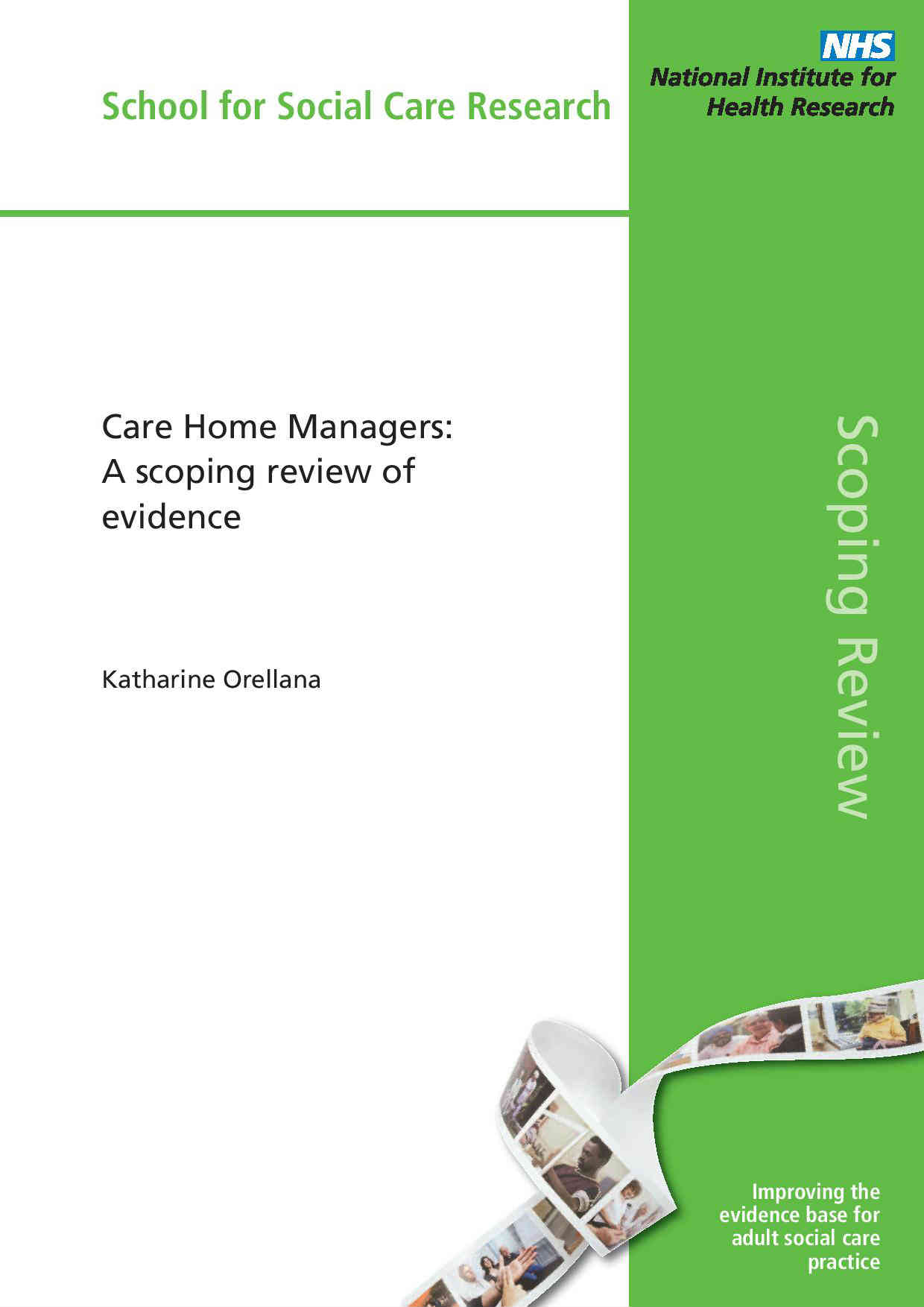 Katharine Orellana is a Research Training Fellow at the Social Care Workforce Research Unit in the Policy Institute at King’s. Katharine’s Care Home Managers: a scoping review of evidence is published today by NIHR School for Social Care Research. (589 words)
Katharine Orellana is a Research Training Fellow at the Social Care Workforce Research Unit in the Policy Institute at King’s. Katharine’s Care Home Managers: a scoping review of evidence is published today by NIHR School for Social Care Research. (589 words)We have a tendency to put care home managers at the back of our minds until a crisis hits the headlines. On such sad occasions, there is suddenly a lot of interest in them.
In England, around 460,000 adults live in 17,350 care homes that have a staff body of around 560,000. Care homes are hugely varied in many ways. They range from small, family businesses to large national and multinational chains offering anything from 1 – 215 beds. Homes may cater for more than one group of people, but they all provide accommodation and personal care. Just over a quarter of them also offer nursing, and these account for about half of all places in care homes as they tend to be larger operations. Staff must support residents with increasingly complex needs.
Why, then, is most of the research that takes place in or about care homes focused on residents, care workers, specific practices or local relationships rather than on their managers? How much do we know about care home managers, their experiences, skills, the supervision and support they receive and the challenges they face?
With ‘Is it well-led?’ being one of the new inspection and monitoring questions set by the Care Quality Commission (CQC), this group surely merits more attention. Interest in residential care has certainly stepped up recently with two year-long programmes publishing their reports in autumn. These were Demos’ Commission on Residential Care for disabled and older people and John Kennedy’s care home inquiry. Both highlighted that care home managers are crucial.
 These are followed, today, by a scoping review of evidence about managers of care homes for adults published by the National Institute for Health Research’s School for Social Care Research. The review brings together a range of evidence published after 2000. Only ten UK and seven US studies directly with or about care home managers since 2000 were identified, most of which related to homes for older people. Other evidence had a different focus.
These are followed, today, by a scoping review of evidence about managers of care homes for adults published by the National Institute for Health Research’s School for Social Care Research. The review brings together a range of evidence published after 2000. Only ten UK and seven US studies directly with or about care home managers since 2000 were identified, most of which related to homes for older people. Other evidence had a different focus.
What has become quite clear is that the people who manage care homes have substantial legal, managerial and commercial responsibilities. They also have a major influence on the daily lives of those who live and work in them through the ethos and culture they have built. As well as having heavy responsibility, care home managers face numerous challenges. However, on the whole, they report being satisfied, if rather stressed. But many would like more recognition and trust from within the health and social care sector itself and also from the general public.
With such a mammoth job and an average annual salary of just over £30,000—only £5,000 more than the average salary across the whole UK economy—it is, perhaps, unsurprising that there is an annual turnover rate of 13% and an overall vacancy rate of 1.2%. Some homes have had no manager for quite some time. Although there is a regulatory requirement to have a registered manager in place at each home, just over 400 have been without one for two years or more. The CQC has now committed itself to taking tougher action against homes with no registered manager.
There will be many vacancies to fill over the coming years as one third are currently aged 55 years or over. Fortunately, one or two national support programmes are already up and running, which managers report to be very valuable.
From a research point of view, there is still much to be learnt about care home managers as a group. We look forward to working with them.
Katharine Orellana is a Research Training Fellow at the Social Care Workforce Research Unit at King’s. Follow @katitao
Reference
Orellana, K. (2014) Care Home Managers: a scoping review of evidence, London: NIHR School for Social Care Research.
See also:
Orellana, K., Manthorpe, J. & Moriarty, J. (2016) ‘What do we know about care home managers? Findings of a scoping review’, Health & Social Care in the Community, doi:10.1111/hsc.12313
At the Margaret Butterworth Care Home Forum
Katharine spoke about this review at the Margaret Butterworth Care Home Forum, 14 May 2014 (slides available).
The Margaret Butterworth Care Home Forum is a forum for discussion and learning focused on dementia care in communal settings such as nursing homes, care homes and extra care housing. It is open to all.